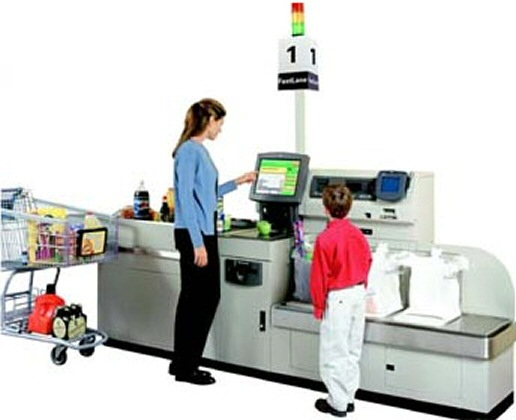A British research suggests that self-service checkouts are turning many shoppers into criminals.
The figures were revealed in a study of 4,952 shoppers by money-saving website watchmywallet.co.uk. They paint an alarming picture of just how many shoppers are willing to act dishonestly to save money.
Although shoplifting can carry a custodial sentence, very few are handed out.
Almost a third of shoppers have admitted to stealing while putting items through the scanners, with many tricking the machines by giving the wrong information.
Additionally, a quarter of those who did not steal admitted their only reason for not doing so was fear of being caught.
The checkouts, which rely on users to scan items, are often poorly supervised – making it easy to abuse the system.
Shoppers admitted to using a wide range of techniques, including slipping extra items through and lying about which items they had.
The most common ruse was to select cheaper fruit or vegetable items when weighing them before paying.
Other popular methods included always selecting “small” when asked the size of items such as salad boxes, as well as bagging goods without scanning.

Supermarket checkouts have devices which detect when an item not paid for makes it into the bagging area, giving rise to the now familiar phrase “unexpected item in the bagging area”.
However, staff regularly overrides the checkout in order to keep queues moving.
When shop staff are not present, small items can easily be slipped into a bag unnoticed and, if challenged, passed off by the customer as a mistake.
Items without barcodes, such as loose fruit and vegetables, provided the greatest opportunities to cheat.
A sixth of shoppers admitted to being dishonest when asked to enter an item manually.
A common trick is to select the cheapest vegetable, typically white onions, when putting a more valuable item through, such as oranges.
Half of those who admitted to cheating said they selected a cheaper item when putting loose items through.
According to experts, offenders are often not driven by poverty but just take advantage of the fact they are unlikely to get caught.
Beverley Stone, a psychologist, said: “Often the people who choose not to obey the rules just don’t have a conscience. They only do the right thing if they think they might be caught, so if the chances are slim they’ll do it.
“I don’t think they can be motivated by poverty because they’ll still be paying for some of the shopping – so they can’t be that poor. These statistics show a lack of morals in this country today.”
The figures come in the wake of a series of cases involving celebrities accused of shoplifting. Earlier this year, television chef Antony Worrall Thompson was cautioned for shoplifting five times in 16 days from a branch of Tesco.
Staff spotted him on camera bagging up goods in the selfcheckout area without paying.
Last year, Lindsay Lohan was sentenced to 360 hours’ community service in the US for stealing a necklace.
And last September, Manchester United goalkeeper David de Gea was challenged by Tesco staff after he allegedly ate a doughnut which he had not paid for.
